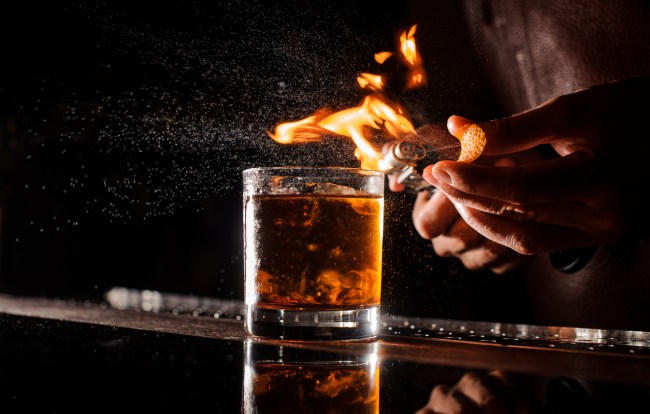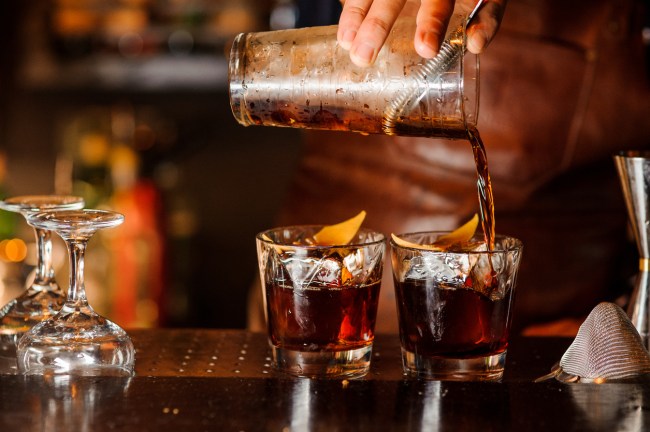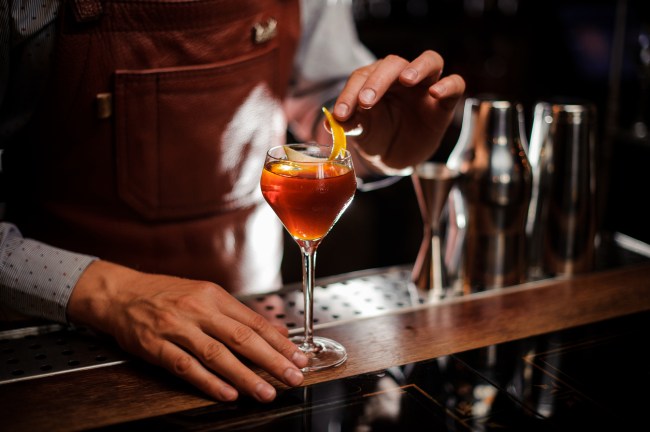
iStockphoto
- You’ve probably thrown back plenty of cocktails over the years, but do you know how they got their name?
- Here’s a look at how the moniker became associated with a specific kind of mixed drink
- Soak up more booze knowledge here
A little over a decade ago, mixology entered the mainstream as people slowly began to realize there might be other ways to consume alcohol beyond ripping shots, adding mixers, and using funnels in ways funnels were never designed to be used.
In the decades prior, cocktails were largely the domain of finance guys who had a habit of guzzling martinis at 11 AM and Manolo-wearing Carrie Bradshaw wannabes washing down cupcakes with Cosmopolitans.
Thankfully, that’s no longer the case.
Nowadays, you don’t have to wander very far in search of a bar lit by dim Edison bulbs featuring a leatherbound drink list filled with classic cocktails and handcrafted concoctions dreamed up by dudes in felt vests (although you might have to yank on a bookcase to get into it).
The world’s best cocktail bars are built upon a foundation that was laid down centuries ago, using lessons from and paying tribute to the past while blazing a path into the future. There’s a story behind every drink they serve and they’re more than happy to tell you about it.
As an enjoyer of alcohol, I’ve gotten quite an education by virtue of drinking at far too many cocktail bars but I recently realized there’s one glaring gap in my knowledge: why is a cocktail called a “cocktail” in the first place?
After doing a bit of digging, I discovered an answer that was more amazing than I ever would have expected.
What Is A Cocktail?

iStockphoto
Before we get into why a cocktail is called a “cocktail” we should probably address exactly what a cocktail is in the first place (and how it came to be).
Technically speaking, a cocktail is a mix of alcohol and at least one other ingredient. As a result, you could apply the label to a whiskey ginger, so I think it’s safer to define it as a drink that contains three or more elements (I’m not counting the lime).
With that said, cocktails as we know them appear to have their origins in the early 18th century thanks to a British pharmacist named Richard Stoughton, who sold his namesake bitters as a herbal remedy out of his shop in London starting in 1712. He advised people to mix it with their drink of choice (namely wine and brandy) to cure whatever ailed them and set the stage for slightly more advanced recipes.
Adding bitters to drinks became commonplace over the next century as recipes got a bit more complex, and while the term “cocktail” appeared in a few publications around the turn of the 19th century, most people agree it wasn’t officially defined until 1806 when a newspaper in New York described it as “a stimulating liquor composed of spirits of any kind—sugar, water, and bitters.”
That definition has become a bit more fluid since then but that formula remains the basis for some of the world’s most popular cocktails, including Old Fashioneds and Manhattans.
As a result, we have an idea of when the word “cocktail” started to get thrown around but it still doesn’t answer the question that brought you here…
Why Is A Cocktail Called A “Cocktail?”

iStockphoto
I’m far from the first person to set out to answer this question and came across more than a few explanations while looking into it that seemed to be fairly plausible at first look.
One says “cocktail” originated in New Orleans, where an apothecary owner named Peychaud dished up brandy and bitters in a drink in a cup normally reserved for serving eggs— the French word for which is coquetier.
The theory here is that the word was a bit too complicated to pronounce and somehow evolved into “cocktail.” However, the apothecary in question didn’t open until the late 1830s, which means we can scratch this off the list.
Others say the word has its roots in Mexico, including one that claims Americans coined the term after dining with a Mexican king who had a daughter named “Coctel,” who served drinks during the meal. Another says English soldiers were served a drink called “Cala de Gallo,” which (as you can probably guess) translates into “cocktail.” However, people more knowledgeable than myself seem to think these unsubstantiated tales seem a tad too convenient to be true.
However, based on what I found, it turns out “cocktail” does have an animal to thank for its name— but it’s probably not the one you’d think.
A number of researchers have traced the origins of “cocktail” back to England, where the word was originally used by horse breeders. It’s said that sellers had a peculiar strategy they turned to in order to perk up their animals to make them more attractive to buyers: shoving a bunch of ginger up their ass.
Yup. You read that right.
The practice made the horses “cock-tailed,” and in England, “cocktail” became the term that was used to describe spicier ingredients that were added to a drink in order to give the imbiber a bit of life. Americans eventually adopted “cocktail” to refer to the drink as a whole and the rest of the world has been doing so ever since.